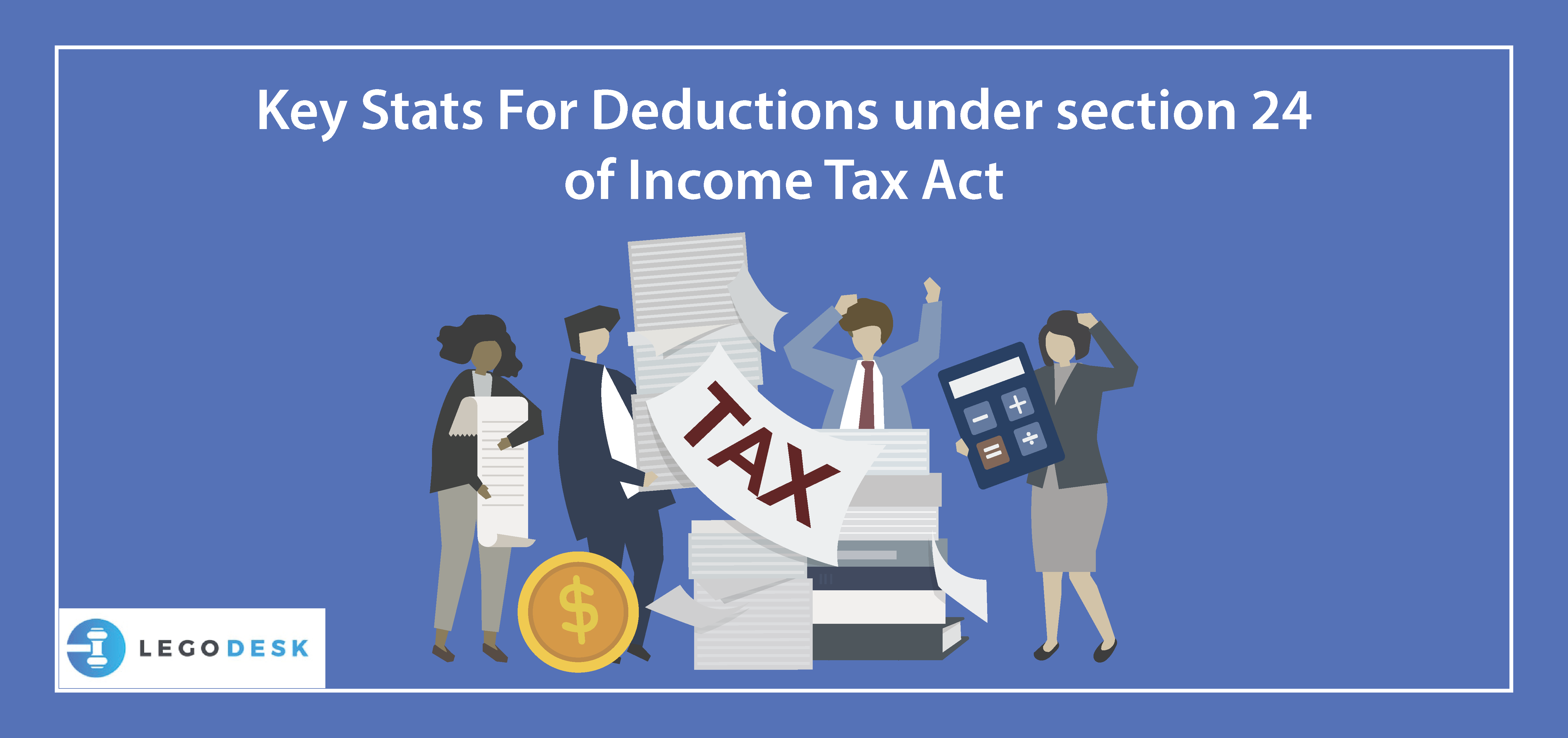Introduction To Section 24 of The Income Tax Act
House Property is one of the most critical parts of the life of a person and the same is taxable. Section 24 of the Income Tax Act, 1961 prescribes the tax on profit derived out of the house property. Apart from section 24, the chargeability arises from section 22 of the Income Tax Act. Although, Income Tax Act has no differentiation between residential and commercial property. Hence, every property is house property under the Act.
Owner and Deemed Owner
Section 27 of the Income Tax Act, 1961 defines Owner and Deemed owner. This definition is essential for the calculation of tax exemption and standard deduction. Further, who is liable to pay tax, the determination depends on the ownership of the property. This also leads to the calculation of claim of the standard deduction and Interest on House Loan.
Deductions under Section 24
For understanding deduction under Section 24 of the Income Tax Act, 1961, the following information is essential. The calculations of the taxable income under the head “income from house property” is after making the following deductions:
Standard Deduction
According to the name, this kind of exemption is allowed to all the taxpayers. Standard deduction allows the assessee a deduction of 30% of the net annual value. Self-occupied houses do not come under the ambit of Standard Deduction. Hence, the standard deduction on a self-occupied house is not applicable.
Interest on Borrowed Capital
Mostly taxpayers while purchasing houses go for housing loans. This leads to the deduction applicable to the interest on loans. This is a great way to claim tax exemption. As there is an exemption of interest on the housing loan from taxation. Therefore, any payment of interest on the principal amount, there is an exemption from the taxation. It is to be considered that the house property includes property which undergoes:
- Any renovation
- Construction
- Repairing or
- If there is an acquisition of any such property.
If the spending of the loan amount is on any of the above activity, then there is an exemption on the interest arising out of such loan.
The calculation of the interest amount and the claim is separate for each year. The reason is that the deduction of tax under section 24 of the Income Tax Act, 1961 in context to housing loan interest is on an accrual basis. This means that the calculation of tax on the interest is from the date of loan borrowing, whether paid or not. The deduction on the interest is according to the same calculation even if there is no payment for the interest during the year. This type of tax deduction differs from the tax deduction under section 80C of the Income Tax Act, 1961. Under section 80C of the Income Tax Act, 1961, the tax deduction applies to the principal repayment.
Agricultural Land
There is a total exemption on the agricultural income from property which is near the Agricultural Land.
Acquired
The maximum amount of deduction on the interest of the home loan is INR 2 lakhs if the occupancy of the home rests with the owner itself. However, in case the due any circumstances the occupancy does not remain with the owner then; also, the tax deduction amount remains the same.
Construction
The tax benefit is INR 30000, if the acquisition does not take place or construction is still in process after five years. In other words after the receiving of loan, the acquisition or construction must take place within five years to claim a deduction of INR 2 Lacs. The period of 5 years starts from the end of the financial year in which the loan was obtained.
Pre-Construction Interest
The payment of interest on the loan for the construction of property before its construction is Pre-construction interest. The definition is as the name suggests. The deduction is only applicable on loan for construction of a property and not for reconstruction or repairing of property. But the claim of interest in the latter case is possible after the completion of such reconstruction or repairing. However, the following points are distinguished from the perspective of Pre-construction interest:
- The claim for this type of deduction can be in 5 equal instalments in a year. The claim of deduction shall be at the beginning of the year after the completion of the acquisition of construction of the property. If the occupant is owner itself, then the deduction claim can be of INR 2 Lacs a year.
- Claim for deduction cannot in the form of any commission, processing fees or brokerage.
- Under Section 24 of the Act, only Standard deduction and Interest on Borrowed Capital are types of deduction. These deductions originate from Annual Net Value, which comes after reducing Property tax from the Gross Annual Value of the property.
Rent
In case the occupancy of the property is not with the owner and the property is on rent, there is no cap for a tax deduction. The person can avail deduction on the total payment of the amount of interest paid under Section 24 of the Income Tax Act, 1961.
Conclusion
It can be concluded that Section 24 of the Income Tax Act, 1961 covers a wide ambit of tax deduction and exemptions. There are widely two deductions that can be claimed:
- Standard Deduction
- Interest on Borrowed Capital
The other deductions forms to be the subset of Standard Deduction and Interest on Loan. The compliance of certain conditions is necessary for claiming a specific limit of deductions. However, in failure to comply with such deduction might result in a decrease in the tax exemption. Also, Section 24 of the Income Tax Act, relates with many other sections for tax exemption purposes. The tax exemption is not exclusively in Section 24 of the Act. But, for tax exemption on house property this section plays a pivotal role in claiming deductions.


